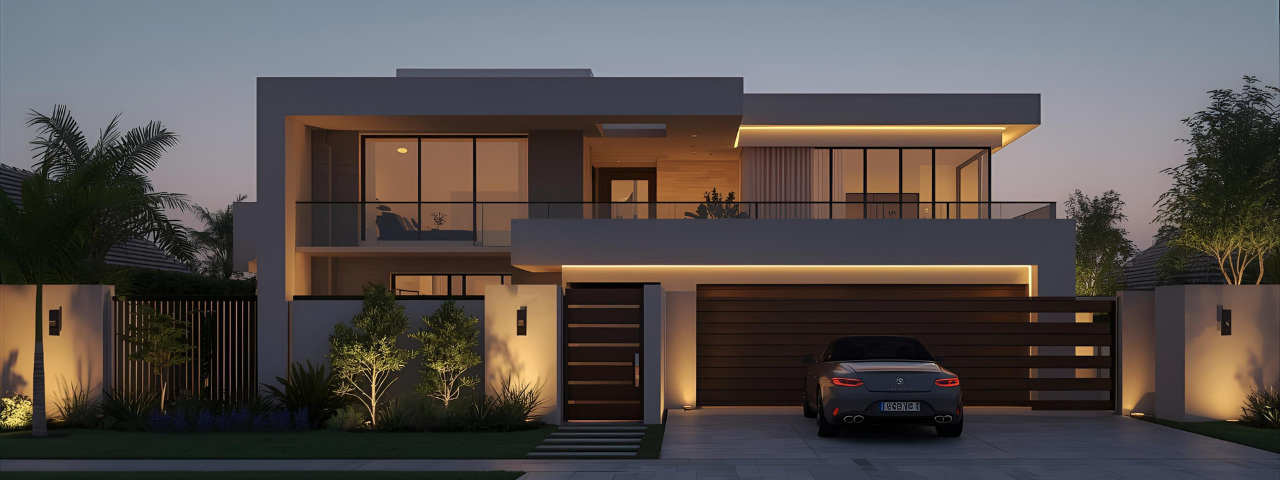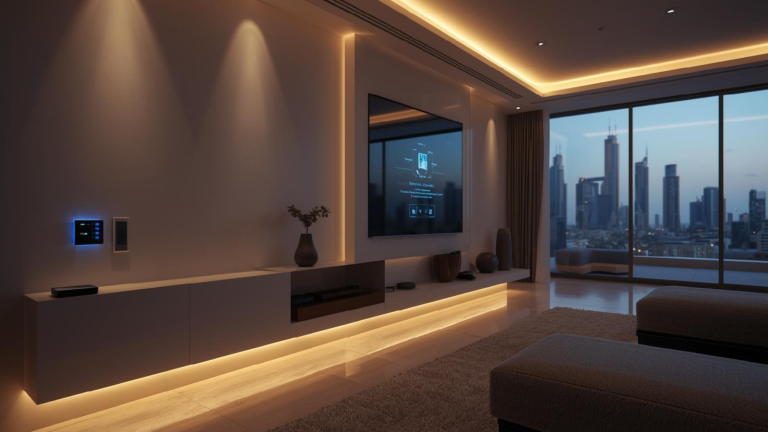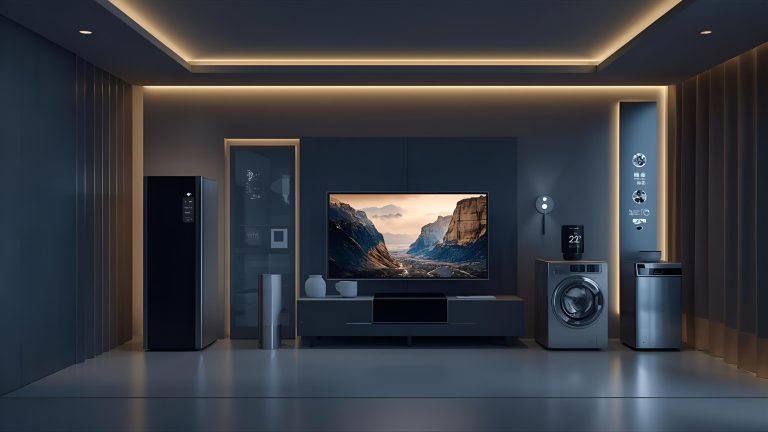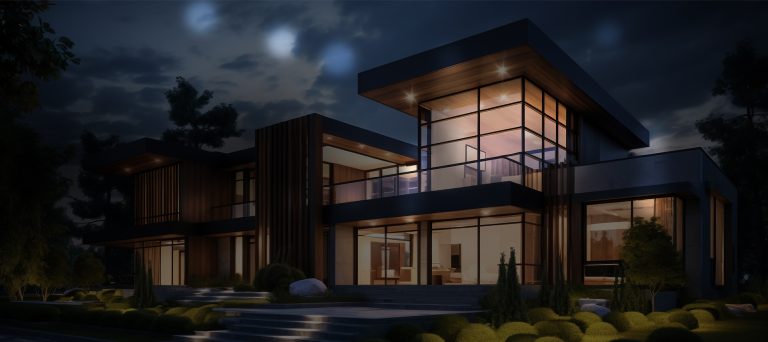Smart home automation has moved beyond being just a tech trend in Dubai and across the UAE—it’s now becoming a fundamental part of modern living. From luxury villas to apartments, offices, and commercial buildings, smart technology is accessible, practical, and tailored for the region’s unique needs. This guide covers what a smart home is today, the key benefits, how smart systems operate, costs, and future trends shaping smart living from 2025 through 2030.
What Is a Smart Home?
A smart home integrates devices and systems into a connected network that can be controlled remotely via apps, voice assistants, or touch panels. These systems automate everyday tasks and improve energy use and security while offering convenience. In Dubai’s environment, smart homes tackle challenges like extreme heat with advanced climate control and energy optimization. Key real-life benefits include:
- Saving time by automating lighting, temperature, and appliances
- Increasing energy efficiency and lowering bills by monitoring consumption
- Enhancing security with remote control of locks, alarms, and cameras
- Giving access and control from anywhere in the world
Ultimately, smart homes create a living environment that adapts to residents’ needs and lifestyle with ease and intelligence.
Key Benefits of Smart Home Automation in Dubai
Smart home automation offers tangible advantages to UAE residents, boosting comfort and lifestyle quality:
- Convenience: Manage AC, lighting, security, entertainment, and appliances from a single app or by voice command
- Energy Savings: AI-powered systems optimize electricity use, managing temperatures and lighting for cost efficiency
- Enhanced Security: 24/7 monitoring with smart locks, cameras, real-time alerts, and biometric access
- Health and Comfort: Air-quality sensors, circadian lighting, and automated climate controls improve well-being
- Future-Ready: Scalable, AI-powered systems grow with technology advances for long-term value
Learn more about all the Benefits of Smart Home Automation here.
How Smart Homes Work Today
A modern smart home functions as an interconnected system with three key parts:
- Strong WiFi Connectivity: Reliable and fast internet is essential for device communication and remote management.
- Smart Devices: Including smart TVs, refrigerators, HVAC units, lighting, security cameras, locks, and sensors. Devices can be added progressively, letting homeowners customize their ecosystem.
- Central Control Hub: Acts as the system’s brain—popular options include proprietary systems plus AI assistants like Amazon Alexa, Google Home, or Apple HomeKit. Compatibility checking before buying devices is critical to seamless integration.
AI and sensors increasingly personalize settings based on occupancy, preferences, and environmental factors such as outdoor heat or air quality, making homes smarter and more efficient.
Smart Home Ideas for All Properties
Starting smart automation can be simple yet impactful with these devices:
- Smart locks for remote access control and security logs
- Leak, smoke, and intrusion alerts on mobile devices
- AI-controlled thermostats adjusting comfort and saving energy
- Voice assistants managing multiple devices naturally
- Smart appliances with remote monitoring and control
- Automated lighting schedules controlled via smartphone
- Sustainable upgrades like solar panels or EV charging stations
Such steps deliver convenience and energy savings without overwhelming complexity.
Smart Home Costs in the UAE (2025–2030)
Pricing depends on home size, device choices, and integration levels:
| Cost Aspect | Range (AED) | Description |
|---|---|---|
| Basic Systems | 5,000 to 15,000 Approx | Voice assistants, lighting, basic security, plugs, simple temperature control |
| Mid-Range Systems | 15,000 to 45,000 Approx | Whole-home lighting, enhanced security, blinds automation, multi-room music, climate zones |
| Luxury Systems | 45,000 to 250,000+ Approx | Fully integrated high-end automation covering security, entertainment, climate, and more |
Professional installation ensures seamless integration and programming. These systems often cost about 30% more than traditional electrical work but provide long-term savings through energy efficiency, better maintenance, and increased property value. Integration with solar panels and energy tariffs enhances savings.
Smart Homes vs Traditional Homes
| Feature | Traditional Home | Smart Home |
|---|---|---|
| Energy Control | Manual | AI-powered & optimized |
| Security | Standard locks & alarms | Smart locks, cameras, alerts |
| Convenience | Manual operation | Remote & voice control |
| Maintenance | Regular manual checks | Predictive & automated |
While initial costs are higher, smart homes offer superior efficiency, security, and comfort over time.
Steps to Make Your Home Smart
- Upgrade WiFi for full coverage indoors
- Identify key areas for automation based on lifestyle needs
- Research and select compatible devices aligned with user preferences
- Hire professionals for expert installation and system integration
- Expand gradually as budget and needs evolve
Smart Home Trends 2025 to 2030 in UAE
UAE smart home technology is evolving rapidly, driven by innovation and local demand:
- AI and Machine Learning: Homes learn habits to auto-adjust settings and reduce energy use
- Multilingual Voice Assistants: Support for Arabic, English, Urdu, and other languages reflects UAE’s diverse population
- Advanced Sensors: Monitor air quality especially during sandstorms, occupancy, leaks, and safety hazards
- Gesture Control: Emerging technology for touch-free device operation, enhancing convenience and hygiene
- Sustainable Technologies: Integration with solar panels and smart meters to meet UAE’s net-zero targets by 2050
- Smart Communities: Neighborhoods designed with connected smart homes and infrastructure for seamless experiences
Future-Proofing Your Home
Investing in scalable and upgradeable smart home solutions ensures your property stays modern and efficient as technology advances. Choose systems that support software updates, modular expansions, and AI capabilities to keep pace with innovations in the 2025 to 2030 timeframe.
Is a Smart Home Worth It?
In Dubai and across the UAE, smart home automation is a smart investment for residents seeking convenience, security, energy savings, and enhanced lifestyle comfort. Whether starting with basic devices or full luxury integrations, smart technology transforms how people live and manage their homes in a fast-paced, tech-savvy world. Begin exploring smart home solutions today and take the first step toward a future-ready intelligent home.
This humanized and SEO-friendly version highlights the latest trends, regional details, and practical advice relevant for 2025 to 2030 smart home adoption in Dubai and the UAE, helping educate and engage readers effectively.




